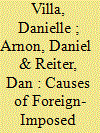|
|
|
Sort Order |
|
|
|
Items / Page
|
|
|
|
|
|
|
| Srl | Item |
| 1 |
ID:
186322


|
|
|
|
|
| Summary/Abstract |
Why do major powers attempt foreign-imposed regime change (FIRC)? This article builds on existing security theory, proposing that a major power looks for signals that a government might exit that major power’s international hierarchy and/or enter an adversary’s hierarchy. Major powers are more likely to attempt FIRC against states that signal shifting preferences. The article tests the theory on American FIRC attempts from 1947 to 1989, covert and overt, failed and successful, proposing that when a hierarchy member or neutral state engaged in economic expropriation, this signaled possible exit from the US hierarchy and/or entry into the Soviet hierarchy, making a US FIRC attempt against that state more likely. It also presents an alternative theory, that economic special interests drove US FIRC attempts. Using new data on expropriations, the article supports the security theory, as expropriations by US hierarchy members made FIRC attempts more likely, but does not support the special interests theory.
|
|
|
|
|
|
|
|
|
|
|
|
|
|
|
|
| 2 |
ID:
189082


|
|
|
|
|
| Summary/Abstract |
What are the origins of conflict-related population displacement? Why do some communities in conflict zones suffer mass casualties while others evade conflict violence? Whether civilians migrate before or after belligerent operations in their vicinity influences the scale of casualties and population displacement in war. “Preemptive evacuation” is a specific manifestation of forced displacement, in which whole communities leave their homes before belligerents attempt to seize control in their local area. In conflicts involving strategic civilian-targeted violence, social cohesion, by promoting collective action, enhances communities’ capabilities to mobilize collective migration, thereby increasing the likelihood of preemptive evacuation. An investigation of the 1948 Arab-Israeli War probes the plausibility of the theory. Detailed information about Arab Palestinian villages in the previously restricted Village Files is used to construct a village-level dataset, which measures social cohesion and other social, political, and economic characteristics. These documents and data provide crucial sources of evidence to researchers investigating Palestinian society and development, the origins of Israel's statehood, and the Israeli-Palestinian conflict. Findings suggest that areas where communities lack social cohesion may suffer higher casualties from targeted violence, signaling a need for urgent diplomatic and humanitarian prevention or mitigation efforts.
|
|
|
|
|
|
|
|
|
|
|
|
|
|
|
|
|
|
|
|
|